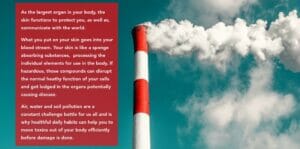 Convincing evidence suggests that diet and activity level are not the only factors in weight gain.
Convincing evidence suggests that diet and activity level are not the only factors in weight gain.
Have you heard of Obesogens? These are chemicals, either natural or man-made, that take control of your metabolic systems, causing weight gain. They come from compounds found in certain plastics; in pesticides and fungicides; in soy and sweeteners; and in the hormones that are injected into our livestock. These obesogens increase appetite and disrupt normal development and lipid metabolism, all of which can lead to obesity.
Chemical “obesogens” may alter human metabolism and predispose some people to gain weight. Fetal and early-life exposures to certain obesogens may alter some individuals’ metabolism and fat-cell makeup for life. Other obesogenic effects are linked to adulthood exposures.
The idea that chemicals in the environment could be contributing to the obesity epidemic is often credited to an article by Paula Baillie-Hamilton, published in the Journal of Alternative and Complementary Medicine in 2002.10 Her article presented evidence from earlier toxicologic studies published as far back as the 1970s in which low-dose chemical exposures were associated with weight gain in experimental animals. At the time, however, the original researchers did not focus on the implications of the observed weight gains.
The role of environmental chemicals in obesity has garnered increased attention in academic and policy spheres, and was recently acknowledged by the Presidential Task Force on Childhood Obesity11 and the National Institutes of Health (NIH) Strategic Plan for Obesity Research.
Want to take action?
CLICK HERE to join my 28 Day Gut Matters Online experience begins November 5 and covers ways to clean your body of many of these toxins!





























